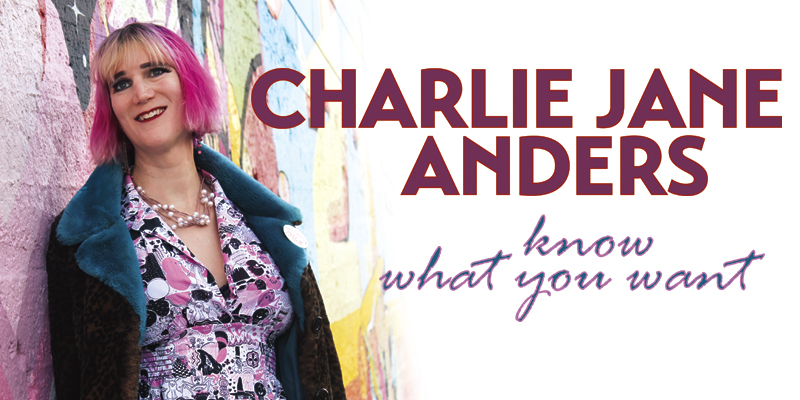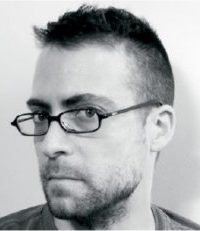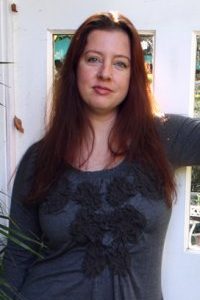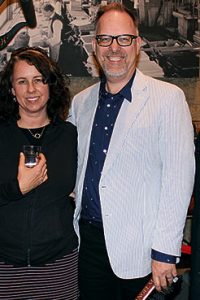Charlie Jane Anders: Know What You Want

CHARLIE JANE ANDERS was born in Connecticut and grew up in the small town of Mansfield. She went to Cambridge University in England, studying English and Asian literature, and spent time studying abroad in China. She has lived in Hong Kong, Boston, and other places, and currently resides in San Francisco.
Anders began publishing SF with “Fertility” (1999) and has published well over 100 stories since then in various genres, including Hugo Award winner “Six Months Three Days” (2011), also a Sturgeon and Nebula Award finalist. “Don’t Press Charges and I Won’t Sue” (2017) won a Sturgeon Award, and “If You Take My Meaning” (2020) was a finalist. Her stories have been collected in Six Months, Three Days, Five Others (2017) and Even Greater Mistakes (2021).
Debut novel Choir Boy (2005) won a Lambda Literary Award. Her first novel-length work of SF was science fantasy All the Birds in the Sky (2016), followed by standalone SF novel The City in the Middle of the Night (2019), a Clarke Award finalist. Her debut YA novel, Victories Greater Than Death (2021), launched the Unstoppable trilogy, followed by Dreams Bigger Than Heartbreak (2022) and Promises Stronger Than Darkness, out this month. She is working on a new adult novel, The Prodigal Mother.
Anders is also a journalist, essayist, editor, comics writer, TV writer, and emcee. Memoir and writing guide Never Say You Can’t Survive: How to Get Through Hard Times by Making Up Stories (2021) won a Hugo Award for Best Related Work. She currently writes for Marvel Comics, and has written for television, including for the 2021 adaptation of comic Y: The Last Man. She organized and hosted the Writers with Drinks reading series from 2001 to 2022, and cofounded SF website io9, later serving as its editor-in-chief until 2016; she was honored with an Emperor Norton award for those efforts in 2009. Last year Anders became a review columnist for the Washington Post, covering new SF and fantasy titles every month.
With partner Annalee Newitz, she ran Other magazine for five years, beginning in 2002. They co-edited the anthology She’s Such a Geek: Women Write About Science, Technology, and Other Nerdy Stuff (2006), and since 2018 they have cohosted multiple Hugo Award-winning podcast Our Opinions Are Correct (with Veronica Simonetti).
Excerpt from the interview:
“Anyone who spends any time with a teenager will tell you they are so curious and so interested, and a lot of them are reading adult fiction alongside YA. When I was a teenager I was reading all sorts of stuff that I probably shouldn’t have been. Especially now, teens know that things are messed up and that nothing makes sense, and that adults don’t really know what we’re talking about. Talking down to teens is a huge mistake. A lot of the best YA I’ve read really doesn’t. That’s part of what made me want to write YA – I read so much YA that was challenging and complex and interesting, that would be impressive and mind-expanding in any subgenre or category of book.
“Practice makes perfect, kind of. The more YA I wrote, the better I was at channeling the YA voice, but also the style of a lot of YA that I loved. I always have a steep learning curve for stuff like that. I was also finding what people were responding to, what people were excited by, and thinking about the conversations that I was having with kids. Another thing in that third YA book is this notion that friendship is at least as important as romance, and that your friends are just as important in your life as your lovers, which I don’t see emphasized enough. These ideas always emerge as you write. It’s something the characters are thinking about, and then you start thinking about it more, and then it feeds on itself.
“I’d only written standalone novels before these YA books. A standalone is also hard, in its own way, but when you get to the end of the book and think, ‘I’ve got to change something in the first 100 pages to fit the ending,’ you can do that. Whereas, if you’re writing the third book in a trilogy, you can’t go back and change the first book unless you’re really way ahead of your publishing schedule. You also have to pay off all this stuff you set up in the first book, and you live with the choices you made. I’m grateful and pleased that, in general, the choices I made in the first book were ones I was happy to live with, but there was definitely some stuff where I had to pay attention and make sure things fit together logically so that I wasn’t creating a mess.
“Doing YA fiction has helped me with plotting and with elements of emotion and character, but I think I’m only going to write standalones for the foreseeable future. I like writing standalones. We started this interview with you asking me, ‘Tell me about the third book,’ but how do I talk about the third book without getting so into the weeds about everything that happened in the first two books? Standalones are fun, and the thing I like about them is that, every single time, you can say, ‘This is what the story is,’ and just explain it. I find talking about sequels really hard, even when I’m talking about other people’s books.
“I learned a lot from YA. I like taking on things as a writer where I’m starting as a beginner once again, because you get to a certain point as a writer, and you have established yourself and you know what you’re doing to some extent, and I never want to get too comfortable. It’s more interesting if I’m figuring out new stuff, and challenging myself, and feeling humbled by my lack of knowledge. I wrote for television, where I was a complete beginner, and just soaking up everybody else’s expertise and sitting there learning at people’s feet. Then, I did YA – I guess those were around the same time – and it was the same thing: ‘I have no idea what I’m doing. There are all these amazing people doing this, I’m just trying to do half as well as they are.’ Now I’m doing comics, which is a similar experience.
“Comics are really challenging. The pacing is hard, and making sure things land the way you want them to is hard. Part of what’s weird about it is, you’re working with an artist, and if you have good communication and rapport with the artist, and you don’t try to cram too much stuff into a single page, you can get something beautiful that works well, and have moments that are just so pure and wonderful. But that takes a lot of practice, and I’m still getting my feet wet. Now, after writing a bunch of comics, I’m getting to the point where I understand how to pace them and how to make sure the big moments land the way I want them to.
“I’m working on New Mutants, one of the flagship X-Men titles, so I’ve been having fun doing that. I helped to create a brand-new transgender superhero for Marvel named Escapade, and originally we were going to launch her in her own solo comic, but then they said, ‘Do you want to write New Mutants instead, and you can bring her in as a major character?’ We have been using New Mutants to help continue her launch, and it’s been really fun.
“I’ve been amazed by how much leeway I’ve gotten from Marvel – they’ve just been letting me run with things. I mean, I definitely get a lot of input; I have an amazing editor that I work with, Sarah Brunstad. She is a powerhouse and she knows her stuff, but she’s also just so smart and collaborative. I got a lot of leeway about what story I was telling, but she suggested the villains, and that’s good because I have no idea who’s available right now in the Marvel Universe. It’s always super collaborative; that’s what I like about comics.
“The things comics and YA have in common are the fast pace, and having a lot of emotion right on the surface. A lot of YA – especially my favorites – are very action-packed, and have a lot going on and complicated plots, which I love. Part of why I wanted to do both comics and YA was getting to do something more action-adventure, more of a fun romp, rather than some of my adult novels, which tend to be a little bit slower and more introspective. Somebody the other day told me a lot of books being published as YA now would have been published as adult science fiction 40 years ago. It would have been half an Ace Double in the ‘60s or ‘70s, and now it’s YA, because that’s where we’re putting those books, but it’s the same stuff, more or less.
“I’m having a total blast writing Escapade. She’s so much fun. I wrote this essay for my newsletter about naive tricksters, and she’s the ultimate naive trickster; she’s a thief, and she has a whole bunch of gadgets that help her pull the wool over people’s eyes. But her superpower is a trickster superpower: she can trade places with people, and any quality pertaining to someone else, she can borrow for a few hours. So, if you’re holding her at gunpoint, she can swap it around so she’s holding you at gunpoint, or if you win a fight and she’s injured, she can swap it around so she won the fight and you’re injured – but just for a few hours, and then it wears off and she’s injured again. If you got her close enough to the president of the United States, she could be the president for a few hours. But her power often goes wrong, or doesn’t work the way she thinks it will, and she makes a lot of mistakes – which is my favorite character trait. She’s very open-hearted and wants to help people and do good, but she sometimes blunders around and makes big messes, which is a lot of fun. She’s new to the Marvel superhero thing, and while she’s not quippy in the way that Spider-Man or Deadpool are quippy, this is all new to her. She’s just slightly wide-eyed, but also making fun of everything because it’s all so weird and silly. I want her to get her heart broken a little bit and get some scuff marks on her. She needs to learn through experience, and it’s fun watching her stumble into situations that she doesn’t know how to handle.
Interview design by Francesca Myman
Read the full interview in the April 2023 issue of Locus.
 While you are here, please take a moment to support Locus with a one-time or recurring donation. We rely on reader donations to keep the magazine and site going, and would like to keep the site paywall free, but WE NEED YOUR FINANCIAL SUPPORT to continue quality coverage of the science fiction and fantasy field.
While you are here, please take a moment to support Locus with a one-time or recurring donation. We rely on reader donations to keep the magazine and site going, and would like to keep the site paywall free, but WE NEED YOUR FINANCIAL SUPPORT to continue quality coverage of the science fiction and fantasy field.
©Locus Magazine. Copyrighted material may not be republished without permission of LSFF.







